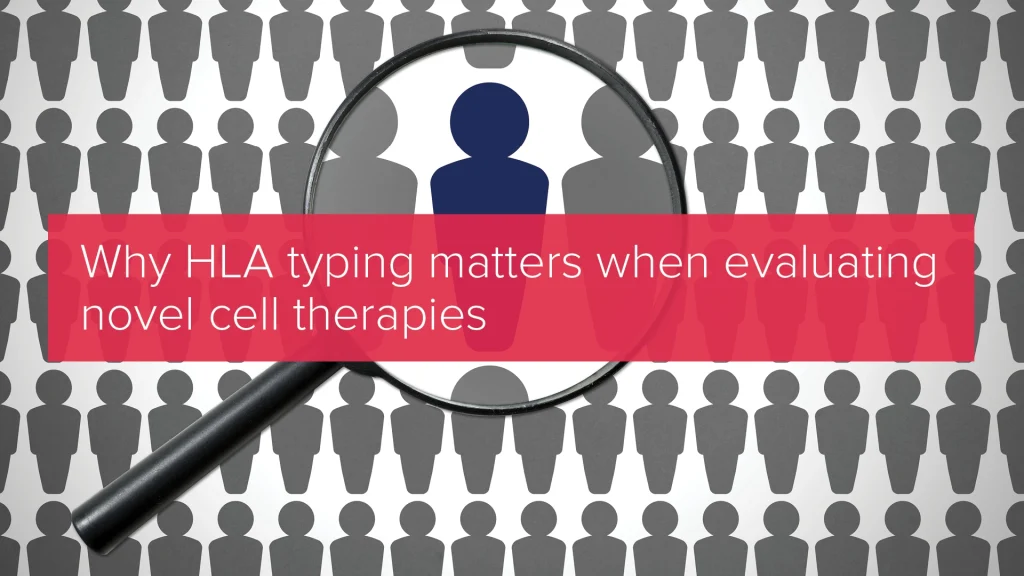July 23, 2024

As cell therapies grow in number, diversity, and complexity, clinical testing programs are seeking new ways to comprehensively characterize candidates while accelerating development — no easy task.
Advances in clinical testing are especially evident in several key areas across the cell therapy space, as detailed in our Cell Therapy Trends Report. At a glance, these areas comprise B-cell aplasia, cytokine profiling, cell enumeration and vector copy number determination, single-cell analytics, and — the focus of this post — human leucocyte antigen (HLA) typing.
All are hugely valuable areas of clinical testing. Together, they paint a fuller picture of cell therapy action and efficacy, helping new, diversified therapies advance within this ever-changing landscape.
What is HLA typing, and why is it important?
Our HLA genes code for cell surface proteins that identify which cells belong in the body and which do not, helping identify and raise the alarm towards a foreign cell or invading pathogen. For organ, blood, tissue or stem cell transplantation, it is crucial that both donor and recipient possess closely matching HLA markers to reduce the chances of a transplant being rejected or triggering an immune response. Donor-recipient compatibility is ascertained via HLA typing assays.
However, HLA typing assays have evolved and widened in scope since they were first developed and validated for this purpose. Newer techniques offer a finer degree of detail thanks to next-generation sequencing (NGS). Unlike other sequencing methods, NGS can more readily define whether HLAs originate from the same or opposite chromosome (cis or trans, respectively), leading to more accurate typing with less ambiguity.
Such in-depth HLA profiling stands to advance the clinical assessment of cancer-targeting cell therapies based on T-cell receptors (TCRs). It can reveal more about how the immune system interacts with cancer cells, enabling the development of new and more tailored immunotherapies to treat various cancers more effectively.
HLA profiling also holds promise in the assessment of patients in clinical trials. Trial participants can be stratified by HLA profile to ensure that an engineered TCR is the right fit for a given HLA-peptide complex, in turn making it more likely that a therapy will achieve its desired effect and progress smoothly to approval.
How clinical testing is changing — and what this means for HLA typing assays
Cell therapies are becoming more diverse, complex, and numerous. We are seeing new biomarkers, mechanisms, agents, constructs, and targets in emerging therapies, all of which require an expansion in testing strategies for comprehensive yet rapid characterization.
In this ever-changing landscape, HLA typing assays must be adapted if they are to effectively support clinical testing and trials, and become relevant for broader therapy evaluation. Assays must become more efficient and adaptable, and innovation must keep pace with the shifting regulatory environment.
Overall, HLA typing assays will need to be:
- Modular, with generally validated, off-the-shelf HLA typing assays being explored to streamline testing both before and during clinical trials
- Complementary, with technologies such as immunohistochemistry and flow cytometry expanding the relevance of HLA profiling to other therapeutic scenarios
In the future, we anticipate that novel therapies will emerge faster than they can be evaluated by existing clinical testing programs. To address this, therapy developers are considering how to leverage both new and existing approaches to HLA profiling to achieve optimal results efficiently.
Download CellCarta’s full Cell Therapy Trends Report to dig deeper into what the changing cell therapy landscape means for HLA typing and other areas of clinical testing, or contact our team to speak to an expert about your cell therapy clinical testing needs.
About the author:

Nathalie Bernard (PhD) is the scientific business director for the Genomic Services unit within CellCarta. Her background is in molecular biology, and she has many years of experience in PCR and sequencing, technologies used to discover or identify DNA and RNA biomarkers of clinical utility. At CellCarta, Nathalie is using her expertise to guide our customers in finding the best solution to their genomic questions.
You might also be interested by
News
Slope and CellCarta Expand Collaboration with Lab Kit Inventory Portal Agreement
February 3, 2026
More infoCellTalk Blog
This is SPARTA: A Framework for Multiplex Immunofluorescence Analysis
November 13, 2025
More info